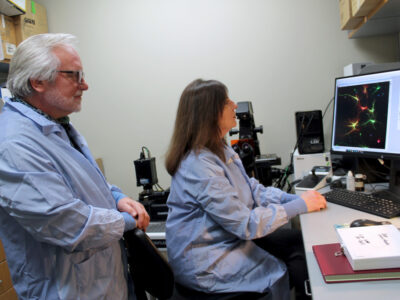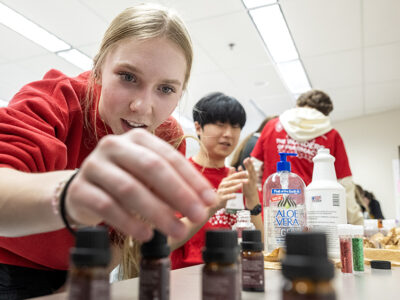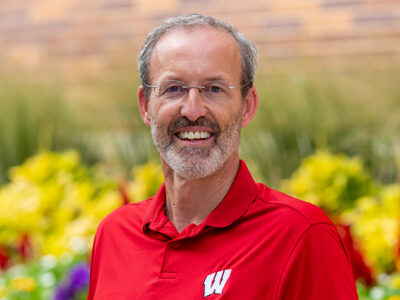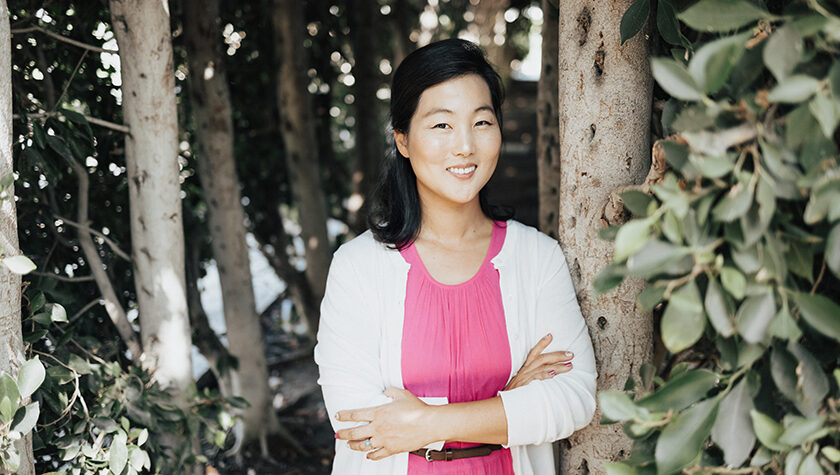
11
September

Alum Amy Chung, combining her training in pharmaceutical science and writing, guides new therapeutics from clinical trials to regulatory approval
By Katie Ginder-Vogel
Photos by Nola Fontanez
Medical writing — does the phrase light up your brain with possibilities or inspire visions of helping thousands of patients access new, much-needed therapies? If not, Amy Chung (MS ’06, PhD ’09) might change your mind.
Chung, an alum of the University of Wisconsin–Madison School of Pharmacy, is currently the associate director of medical writing and transparency at Jazz Pharmaceuticals and has also worked at well-known pharmaceutical companies like Bristol-Meyers Squib and Amgen.
As a medical writer, Chung focuses on clinical trials from Phase 1 through Phase 4 and develops clinical trial protocols and reports with completed trial results. Once all the clinical trials have completed, she writes and packages the collective set of clinical trials results together for submission to the U.S. Food and Drug Administration or other regulatory agencies, like the European Medicines Agency or other global health authorities, for approval to market the treatment for the public.
“We focus on high ethics and high transparency, to ensure patient safety and privacy,” says Chung. “From the beginning to the end of each trial, and as a collective set of trials for that therapeutic area, I package it all together for submission. There are patients with critical diseases and unmet needs waiting for the therapy that we’re pushing through.”
Combining passions for science and writing
As an undergraduate, at Chapman University in California, Chung initially planned to become a journalist.
“Then I took Biology 101 and fell in love with science — the body’s repair mechanism, immune cells, and how they come in like little armies and hike up fevers to kill virus proteins,” says Chung. “It was so fun to me, so I defected to biochemistry and jumped head in.”
“It’s satisfying to get therapies delivered to patients who often have no options to treat their serious conditions.”
—Amy Chung
Chung couldn’t decide between chemistry and biology, so she double majored, with a minor in English. When she graduated, the UW–Madison School of Pharmacy was at the top of her list for graduate school.
“It’s a very well-respected, well-known program, and when I interviewed, the grad students were so much fun,” says Chung. “I interviewed in January, and they took us to Lake Mendota, which was all frozen, and we had a big snow fight. Everybody was so smart, and friendly, and there was this culture of excellence and playfulness that really drew me in.”
Chung joined W. John Kao’s seventh-floor lab, which his grad students jokingly referred to as “the penthouse.” Kao later became the chair professor of translational medical engineering at the University of Hong Kong.
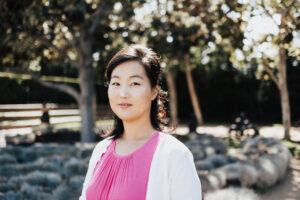
Chung describes Kao’s research group as a “perfect world of chemistry and biology,” where she synthesized biomaterials that would signal to immune cells to recruit them for a cascade of wound healing reactions.
“Half the year, I synthesized biomaterials with peptide signals, and the other half I spent doing cell culture and biochemistry to see cell signaling and the effects of these biomaterials on immune response,” she says. “I got to do both biology and chemistry.”
As she began publishing her research, Chung found that she loved the process.
“I loved writing, packaging the data together, telling the story, and submitting it,” Chung says. “I loved writing and applying for grants.”
She used her writing skills to apply for and earn the prestigious three-year National Science Foundation (NSF) fellowship.
“During a yearlong postdoc at UCLA, I went to an alternative careers seminar, and Amgen came and talked about medical writing,” says Chung. “I love writing and project management, and it sounded like a shoo-in for me. My current position actually has me doing project management 60 percent of the time to move projects forward.”
Patient focus
Chung began her regulatory writing career focusing on clinical trials for cardiovascular therapies, then focused on cholesterol lowering drugs at Amgen and treatments for multiple sclerosis at Bristol Meyers Squibb. Now, at Jazz Pharmaceuticals, she is working on trials for medications to treat sleep disorders.
“It’s satisfying to get therapies delivered to patients who often have no options to treat their serious conditions,” she says. “I also appreciate the variety and fast pace. There’s never a dull moment.”
Clinical trials, and Chung’s role as a regulatory writer, move through Phases 1 through 4. Once Phase 3 is complete, companies can submit an application package for approval to put the therapy out on the market and into the public space for treatment. Generally, Phase 4 studies are conducted with approved drugs and are intended to evaluate the drug long-term or in various real-world use settings.
From drug discovery to market approval, the process can take about 10 to 12 years, depending on the therapeutic area and how the clinical trials are set up. Some trials can be rather large and complex. For example, a clinical trial for cardiovascular related diseases can include thousands or even tens of thousands of patients and take five years or more to complete.
“It really helps me walk the day in the life of a patient with a select disease, helps me understand what they’re going through, and makes me work that much harder to get them what they need.”
—Amy Chung
Chung’s current employer, Jazz Pharmaceuticals, focuses on developing medications for rare disease states.
“I love that this company that is willing to invest more in pediatric indications than others I’ve seen,” Chung says. “It’s hard to enroll kids in clinical trials. It takes longer to recruit them and longer to finish the clinical trial. But these pediatric patients still have serious conditions with unmet therapeutic needs.”
Every clinical trial design is different, and the regulatory path to ultimate submission is different, depending on how many trials will be included, how large they are, and how long they will take.
“It’s all very creative, in terms of how we strategize around it,” says Chung. “The submission planning process is interesting, as are regulatory pathways and how you navigate them. The back-and-forth dancing with the agencies is different; you have to defend your position and the results from your trial — it’s like defending your PhD again.”
Federal regulatory agencies have their own statisticians who review clinical trial data and ask questions.
“You put your statistician hat on and respond,” says Chung. “I’m very hands-on and drive those conversations.”
“The medical writing field is more than writing,” Chung explains. “We have to acknowledge concerns and explain what the data means from all angles.”
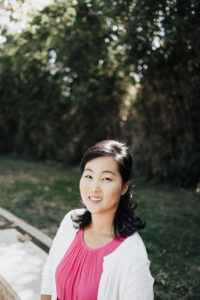
Chung works with statisticians, safety physicians, medical monitors, clinical pharmacologists and other experts to include all of their perspectives.
“The regulatory writer reconciles all that as a package and tells that story to the agency, really making the case for safety and efficacy,” says Chung.
Because of her specialized skill set, Chung’s next project usually finds her.
“Once we submit, I join another team, and start the process again. Someone will typically reach out to let me know they are getting ready to submit for a different disease and a new drug they’ve developed,” Chung says. “I look for patients who are waiting for a therapy for their disease state.”
Chung’s major point of pride in her career is helping patients with critical unmet needs. She remembers a stem cell trial for which she was writing a protocol for Stage 4 skin cancer patients who had run out of all options, and the stem cell therapy extend their lives by five years.
“There is powerful science out there, and that was one of the moments where every day, waking up, I couldn’t wake up early enough,” says Chung. “Patients were waiting.”
She frequently attends various patient advocacy talks.
“It really helps me walk the day in the life of a patient with a select disease, helps me understand what they’re going through, and makes me work that much harder to get them what they need,” she says. “I get to help people.”
Chung’s career has only gotten more fulfilling with time.
“Over the years, I’ve fallen more in love with storytelling,” says Chung. “If you have the capacity for detail orientation, plus higher-level thinking, medical writing is a perfect field. If you enjoy diversity and are not married to a therapeutic area, medical writing is also a great match.”
Passing knowledge
Chung says her experience at the UW–Madison School of Pharmacy contributed to thinking skills and an enthusiasm for learning new scientific concepts.
“I might come across topics I don’t understand, but because my professional training from the School of Pharmacy has been so broad and so well-rounded, I don’t have any hesitation on new learning curves,” says Chung. “I use concepts from the Principles of Pharmaceutical Sciences course every day.”
Chung also met her best friend in graduate school, Kwadwo Owusu-Ofori (PhD ‘10), when they entered the program together in 2004. They co-chaired the UW–Madison student chapter of the American Association of Pharmaceutical Scientists, started a medical writing blog, and are currently writing a book, The Perfect Science Career. Slated for release this fall, the book is aimed at helping students match their professional intentions with a variety of career options.
“I might come across topics I don’t understand, but because my professional training from the School of Pharmacy has been so broad and so well-rounded, I don’t have any hesitation on new learning curves.”
—Amy Chung
“There’s so much out there but not a lot of ways for students to find out what’s actually out there,” says Chung. “Having been in industry for the last 10 years, there’s so much I want to share. Kwadwo has been on the government and entrepreneurial side, and we’ve both been in academia. We have a good database to share with students to help them find some direction.”
The words of her PhD advisor, Kao, stay with her.
“He said, ‘Grad school isn’t just about research or science, it’s about figuring out different pathways and enjoying that journey,’” says Chung. “I always keep that in mind.”





